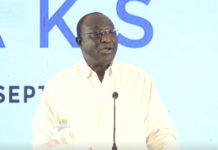
Expectations are high within the Ghanaian business community ahead of the swearing in of the country’s President-elect Nana Akufo-Addo on January 7.
The President-elect prior to last year’s general elections promised to slash taxes and create a more congenial environment for the private sector to thrive.
After winning the elections by a huge margin, the president-elect now has a huge task of fulfilling his promises to voters.
Major promises
Paramount among his promises are establishing a factory in every district of Ghana, constructing dams in every district particularly in the northern zone of the country and reducing tax on financial services. Businesses consider this significant if executed since that will help grow their operations.
Lobbying
Even before the new president takes office officially, various Business Associations have started lobbying to be involved in executing some of the promised projects.
The Association of Ghana Industries, the umbrella body that represents the interest of industries in some critical sectors of the economy has said it is better positioned to partner government in making its “One district One factory” policy a reality. Its President, James Asare Adjei is optimistic the Association’s presence across the entire country in various sectors makes it a viable partner for the success of the project. “We are going to do everything possible to support the policy because we cover over twenty three sectors of the economy,” he said.
It also wants the incoming government to increase the allocation of budgets from the current 1 percent of government budget.
Energy
The Industrial and Commercial Workers Union of Ghana (ICU) has also asked the incoming president to ensure that businesses don’t collapse and lay-off workers as a result of another power crisis.
Statistics from the ICU indicate that about 13000 workers lost their jobs since 2015 in the heat of the power crisis that crippled the manufacturing sector of Ghana over the past two years.
The outgoing government put in place some measures to fix the crisis by resorting to emergency power plants, but the General Secretary of the ICU, Solomon Kotei said the incoming government must prioritize fixing challenges within the power system.
“We will expect a lot from the incoming government as to how they will stabilize the power sector,” he said, adding that there were earlier indication from the Ghana Grid Company about an imminent power crisis due to Ghana’s indebtedness to Nigeria for Gas supply.
He further added that “Maybe the truth about the situation must be made known to the incoming government to avoid any possible job cuts within the first year of the new government”.
He wants the incoming government to carry out an assessment of the power sector and how it intends solving the problem.
Textiles Industry
The Ghana Federation of Labour is also pushing for the creation of a congenial environment to help revive the ailing textile industry of Ghana.
Currently only three firms are operating with a workforce of 1,900 compared to the 25,000 workers 20 years ago.
This is as a result of the influx of fake textiles into the country from China which has forced many local companies out of business.
Secretary-General of the Ghana Federation of Labour Abraham Koomson wants the newly elected government to help fix challenges in the sector to create more jobs.
“Surviving companies should be invited by the New Trade and Industry Minister to understand the challenges of the companies and how best they can help revive the sector,” he said. I don’t think the challenges have to do with capital but the unfair competition and influx of pirated textiles which is crippling their businesses.”
Ghana is estimated to be losing close to 20 million dollars as a result of Textile piracy and smuggling annually.
Many analysts of Ghana’s economy have predicted that the president-elect, Akufo Addo will have a lot of work to do to put the country’s economy back on track when he takes office on January 7.




